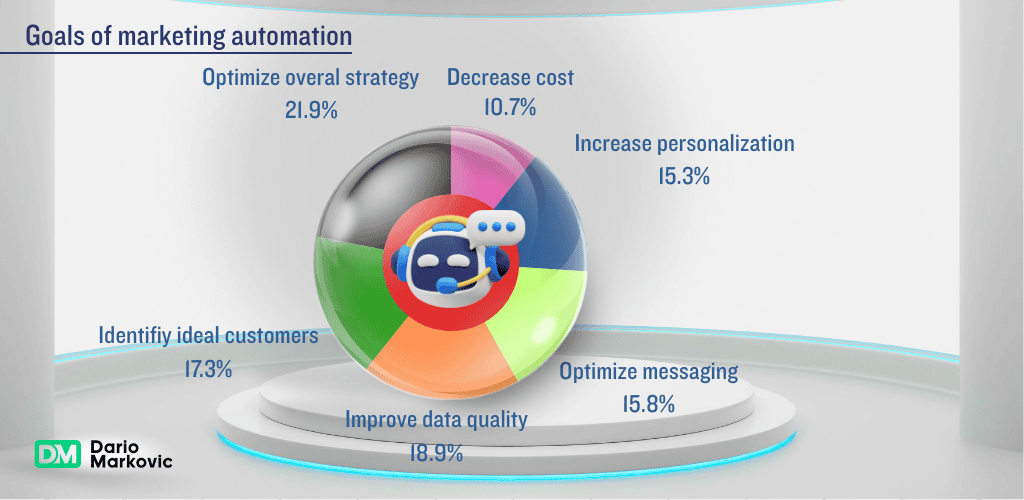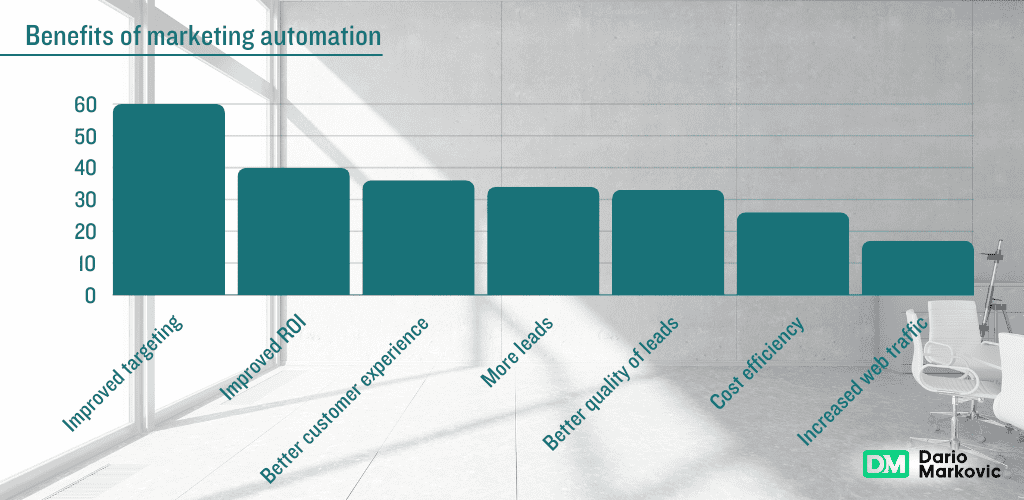Understanding the Basics of Marketing Automation for Online Business
As someone who has spent nearly a decade in the marketing industry, I’ve experienced firsthand how marketing automation for online business can be that decisive kick to propel a business from barely floating to churning millions. Imagine freeing up hours while still delivering personalized marketing messages to your customers.
Sounds like a dream, right? Let’s dive into marketing automation and see how it can revolutionize your online business.
What I Will Show You in This Blog
Fundamentals and Benefits: You’ll learn the basics of marketing automation for online business, including its key benefits like efficiency, consistency, personalization, data-driven decisions, and scalability.
Practical Insights and Tools: I’ll share my personal experience with marketing automation, provide statistics to highlight its impact, and guide you on choosing the right tools and implementing them effectively.
Future Trends and Challenges: We’ll explore common challenges and solutions in marketing automation, as well as future trends like AI, omnichannel marketing, advanced analytics, and enhanced personalization.
The Fundamentals of Marketing Automation
Marketing automation for online businesses involves using software to automate repetitive marketing tasks such as email campaigns, social media posts, and ad management. This saves time and ensures consistency and personalization in marketing efforts.
By automating these processes, businesses can focus on more strategic activities that drive growth and engagement.
Key Benefits of Marketing Automation
Implementing marketing automation for online businesses offers several advantages. Automating repetitive tasks frees up time for more strategic activities, ensures consistent customer communication, and allows for personalized marketing messages based on customer behavior.
Additionally, it provides valuable insights through analytics and reporting and easily scales with business growth. These benefits make marketing automation an essential tool for any online business looking to improve its marketing efforts.
Statistics on Marketing Automation for Online Business
Marketing automation for online business has seen significant growth and adoption over the past few years. The data highlights its importance and effectiveness in improving marketing efforts and driving business success. Here, we’ll explore various statistics that underscore the impact of marketing automation.
The global marketing automation market is projected to reach $13.71 billion by 2030. This growth is driven by the increasing need for businesses to streamline their marketing processes and improve efficiency.
Currently, 76% of companies use marketing automation1, reflecting its widespread adoption across industries. Additionally, 91% of marketers say marketing automation helps them achieve their objectives.

Key Statistics
- Market Growth: The global marketing automation market is projected to reach $13.71 billion by 2030.
- Adoption Rates: 76% of companies use marketing automation.
- Customer Journeys: 10% of customer journeys are fully automated.
- Importance: 91% of marketers say marketing automation helps them achieve their objectives.
- Email Impact: Automated emails generate 31% of all email orders.
- Conversion Rates: 77% of users saw an increase in conversions after using marketing automation software.
- Lead Generation: 80% of marketing automation users saw an increase in the number of leads.
- Overall Success: 91% of users say marketing automation is very important for the overall success of online marketing.
These statistics highlight the significant impact marketing automation can have on an online business’s success. The ability to automate repetitive tasks not only saves time but also improves the effectiveness of marketing campaigns.
In addition to these benefits, marketing automation provides valuable insights through analytics and reporting. This data-driven approach allows businesses to make informed decisions and optimize their marketing strategies. For example, automated emails, which generate 31% of all email orders, demonstrate the power of targeted and personalized communication.
As the market continues to grow, the adoption of marketing automation is expected to increase. Businesses that invest in these tools can expect to see improvements in efficiency, customer engagement, and overall marketing performance.
The future of marketing automation looks promising, with advancements in AI and machine learning set to further enhance its capabilities.

Choosing the Right Tools
Selecting the right marketing automation tools is crucial for maximizing the benefits. Ensure the tool offers the needed features, such as email marketing, social media management, and analytics. Check if the tool integrates with your existing systems and platforms, and choose a tool that is user-friendly and easy to set up. Consider your budget and the tool’s pricing structure, and look for tools that offer good customer support and resources.
These are some of my favorites:
- HubSpot Marketing Hub: Known for its comprehensive features, including email marketing, social media management, and analytics.
- Adobe Experience Cloud: Offers robust tools for personalized marketing and customer experience management.
- ActiveCampaign: Great for email marketing automation and CRM integration.
- Mailchimp: Popular for its user-friendly interface and extensive email marketing capabilities.
- GetResponse: Ideal for small to medium-sized businesses, offering a range of automation features.
- Keap (formerly Infusionsoft): Excellent for small businesses and startups, focusing on ease of use and affordability.
- Brevo (formerly SendinBlue): Known for its simplicity and effectiveness in email marketing.
These tools offer a variety of features to help streamline your marketing efforts and improve efficiency.
Implementing Marketing Automation
Implementing marketing automation for online businesses involves several steps. First, clearly define what you want to achieve with marketing automation. Next, select the right tools based on your needs and budget.
Segment your audience to send targeted and personalized messages, and set up automated workflows for tasks like email campaigns and social media posts. Finally, continuously monitor performance and optimize your strategies based on data insights.
Following these steps can help ensure a successful implementation of marketing automation.
Implementing marketing automation for online business involves several steps:
- Define Goals: Clearly define what you want to achieve with marketing automation.
- Choose Tools: Select the right tools based on your needs and budget.
- Segment Audience: Segment your audience to send targeted and personalized messages.
- Create Workflows: Set up automated workflows for tasks like email campaigns and social media posts.
- Monitor and Optimize: Continuously monitor performance and optimize your strategies based on data insights.
Common Challenges and Solutions
While marketing automation for online business offers many benefits, it also comes with challenges. Marketing automation tools can be complex to set up and use, so invest in training and resources to get the most out of your tools.
Managing and integrating data from different sources can be challenging, so use tools that offer robust data integration and management features. Creating personalized content for different audience segments can be time-consuming, so use automation to streamline content creation and delivery.
Addressing these challenges can help you fully realize the benefits of marketing automation.
Future Trends
The future of marketing automation for online business looks promising, with several trends emerging. AI and machine learning will play a significant role in enhancing automation capabilities. Automation will increasingly support omnichannel marketing strategies, providing a seamless customer experience across multiple channels.
Enhanced analytics and reporting features will provide deeper insights into customer behavior and campaign performance. Automation will enable even more personalized marketing efforts, improving customer engagement and conversion rates.
Staying ahead of these trends can help businesses maximize the benefits of marketing automation.
Real Life Experiences with Marketing Automation
Example 1: E-commerce Store Boosts Sales with Email Automation
A Reddit user shared their experience with marketing automation for their small e-commerce store. They implemented an email automation tool to send personalized follow-up emails to customers who abandoned their shopping carts.
By setting up automated workflows, they were able to recover 25% of abandoned carts, leading to a significant increase in sales.
The user highlighted how the automation tool allowed them to focus on other aspects of their business while still maintaining effective communication with their customers.
Example 2: SaaS Company Improves Lead Nurturing
Another Reddit user, who runs a SaaS company, discussed how they used marketing automation to improve their lead nurturing process. They set up automated email sequences to educate potential customers about their product and its benefits.
By segmenting their audience based on behavior and engagement, they were able to send targeted messages that resonated with each segment. This approach resulted in a 40% increase in lead conversion rates.
The user emphasized the importance of using data to personalize communication and build stronger relationships with leads.
Example 3: Digital Marketing Agency Enhances Client Campaigns
A digital marketing agency shared their success story on Reddit about using marketing automation to enhance their clients’ campaigns.
They used automation tools to manage social media posts, email campaigns, and ad targeting. By automating these tasks, they were able to deliver more consistent and timely content for their clients. The agency reported a 50% improvement in campaign performance and a significant reduction in manual workload.
They also noted that automation allowed them to provide more value to their clients by focusing on strategy and creative work.
These real-life examples demonstrate the tangible benefits of marketing automation for online businesses.
Whether it’s recovering abandoned carts, improving lead nurturing, or enhancing campaign performance, automation can significantly impact business success.
My Personal Experience
Having worked in business automation for nearly a decade, I’ve seen firsthand the transformative impact of marketing automation for online business.
One of my clients, a small e-commerce store, struggled with managing their email campaigns and social media posts. By implementing a marketing automation platform, they were able to automate these tasks, resulting in a 30% increase in sales within six months.
The ability to segment their audience and send personalized messages significantly improved their customer engagement and conversion rates.
Marketing automation for online business involves using software to automate repetitive marketing tasks such as email campaigns, social media posts, and ad management. This helps businesses save time, improve efficiency, and deliver personalized marketing messages.
The key benefits include:
- Efficiency: Automates repetitive tasks, freeing up time for strategic activities.
- Consistency: Ensures consistent communication with customers.
- Personalization: Delivers personalized marketing messages based on customer behavior.
- Data-Driven Decisions: Provides valuable insights through analytics and reporting.
Scalability: Easily scales with business growth.
When choosing a marketing automation tool, consider the following factors:
- Features: Ensure the tool offers the features you need, such as email marketing, social media management, and analytics.
- Integration: Check if the tool integrates with your existing systems and platforms.
- Ease of Use: Choose a tool that is user-friendly and easy to set up.
- Cost: Consider your budget and the tool’s pricing structure.
- Support: Look for tools that offer good customer support and resources.
Some popular marketing automation tools include HubSpot, Adobe Experience Cloud, and ActiveCampaign. Each tool offers a range of features to help streamline your marketing efforts.
Common challenges include:
- Complexity: Marketing automation tools can be complex to set up and use.
- Data Management: Managing and integrating data from different sources can be challenging.
- Personalization: Creating personalized content for different audience segments can be time-consuming.
To overcome these challenges:
- Complexity: Invest in training and resources to get the most out of your tools.
- Data Management: Use tools that offer robust data integration and management features.
- Personalization: Use automation to streamline content creation and delivery.
Future trends include:
- AI and Machine Learning: Enhancing automation capabilities.
- Omnichannel Marketing: Supporting seamless customer experiences across multiple channels.
- Advanced Analytics: Providing deeper insights into customer behavior and campaign performance.
- Personalization: Enabling even more personalized marketing efforts.
Marketing automation significantly enhances email marketing by automating the sending of targeted and personalized emails. Automated emails generate 31% of all email orders, demonstrating their effectiveness in driving conversions.
The global marketing automation market is projected to reach $13.71 billion by 2030, reflecting its increasing importance and adoption across industries.
Marketing automation improves lead generation by automating the process of capturing, nurturing, and converting leads. 80% of marketing automation users saw an increase in the number of leads, highlighting its effectiveness in this area.



